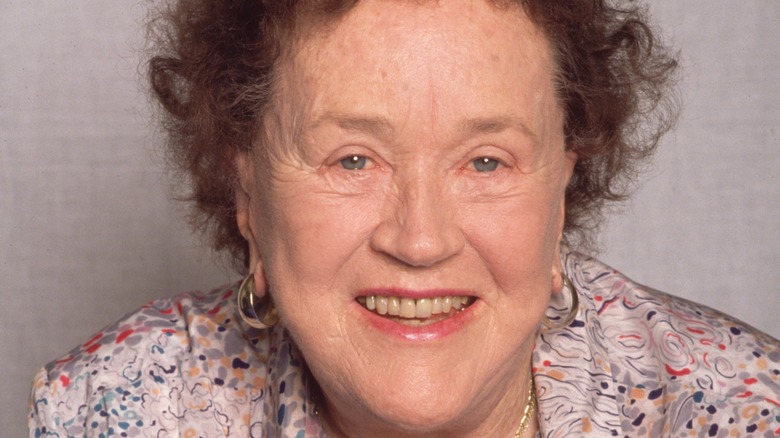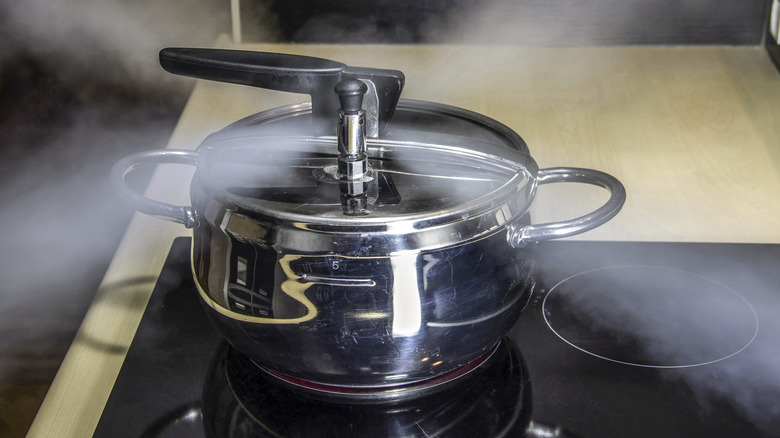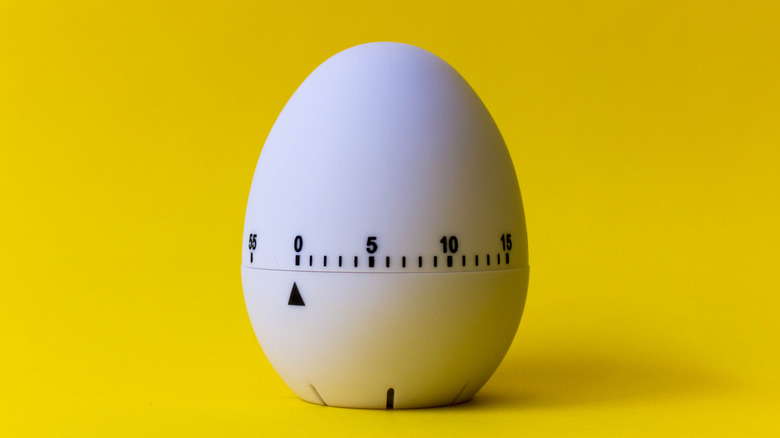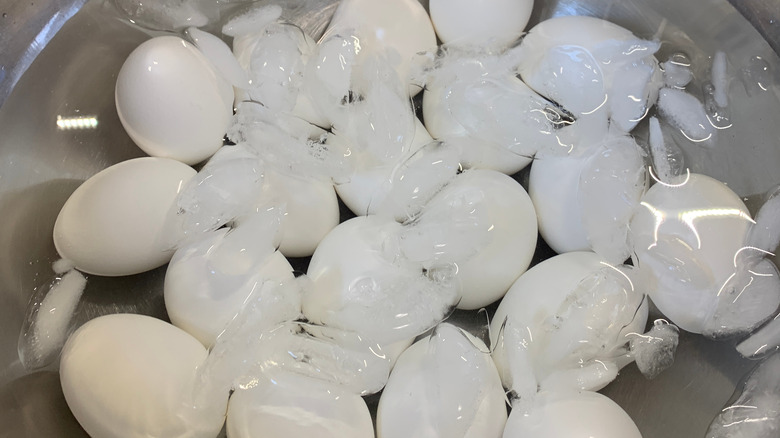Julia Child's Hard-Boiled Egg Trick Is Almost Impossible To Mess Up
Anyone who has ever made hard-boiled eggs has probably run into an issue or two, whether it was while cooking the yolks just so or trying to perfectly peel the shells. If you drop the eggs into the water too hard, they can crack and leak as they boil. If you don't peel them carefully, the whites can get knicked. And if you use a fresh egg, the shell might not want to come off at all. (Really, moisture escapes from eggs over time and is replaced with air, making the shells easier to peel, explains Our Everday Life). For such a simple food, hard-boiled eggs can be surprisingly difficult to deal with.
However, even if you find yourself with super fresh eggs, clumsy hands, or miles above sea level where water boils at a totally different temperature, there's a route to perfectly cooked hard-boiled eggs. It comes, of course, from the French cooking expert Julia Child. Use it whenever you're in the mood for extra protein on salads, grain bowls, and other easy lunches.
Child made hard-boiled eggs in a pressure cooker
Back when he was a young culinary student in 1995, James Schend was invited to help prepare food for celebrity chef demonstrations at the annual Food & Wine Classic in Aspen, Colorado, he wrote in Taste of Home. One of his tasks was boiling eggs for Julia Child's Nicoise salad — easy enough. But what Schend had not accounted for was the difference in elevation in Aspen. That's when Child stepped in to solve the problem.
Since the chefs were cooking at a higher elevation, the water was boiling at a lower temperature than they were accustomed to, which resulted in the eggs not cooking in the amount of time they would have otherwise. Ultimately, Child explained that making hard-boiled eggs in a pressure cooker was the sure-fire solution. That's because pressure cookers create their own air-tight environment, which means they can cook eggs or any other food exactly the same way no matter where you are. So, whether you're in the Rocky Mountains or Death Valley, you can turn to your Instant Pot for perfectly hard-boiled eggs every time.
This is how long it takes to pressure cook eggs
While many pros suggest always hard-boiling eggs that have been sitting in the fridge for a few days, Allrecipes claims that even fresh eggs can be hard-boiled in the pressure cooker and still be easy to peel. However, no matter how long ago you bought your eggs, you still need to know exactly how long to cook them. Allrecipes' five-star recipe suggests pressure cooking eggs at low pressure for six minutes. After the eggs have been on heat for six minutes, they will need another five minutes inside the cooker to allow the pressure to decrease. Finally, you'll end up with beautifully hard-boiled eggs that Julia Child would have been proud to put in any salad.
Once you've made Instant Pot hard-boiled eggs a few times and feel comfortable with the method, you can try adjusting the cook time. If you prefer a slightly softer egg, for example, you might want to reduce the cook time to five minutes instead of six. If, on another day, you want jammy soft-boiled eggs, try an even shorter cook time. As you continue to use this trick, you can fine-tune the process to make eggs exactly how you like them.
Why an ice bath is the final step when hard-boiling eggs
For many recipes, including those from Taste of Home and Allrecipes, the final step when hard-boiling eggs in a pressure cooker is to place the cooked eggs into an ice bath. While the pressure is coming down, fill up a large bowl with ice and cold water, then gently place the eggs inside when they're ready using a slotted spoon. This simple ice-bath trick keeps the hot eggs from further cooking inside their shells, explains The Modern Proper, the same way that blanching vegetables helps preserve their texture and color.
The final cooling step is also important for peeling hard-boiled eggs. According to The Kitchn, the shock of the temperature change causes the egg whites to pull away from their membranes, which means they should not stick to the shell while you peel them. And, of course, no one wants to burn their fingers on scalding-hot eggs before lunchtime. There you have it: For hard-boiled eggs with immaculate yolks and peel-able shells, always use a pressure cooker and an ice bath.



